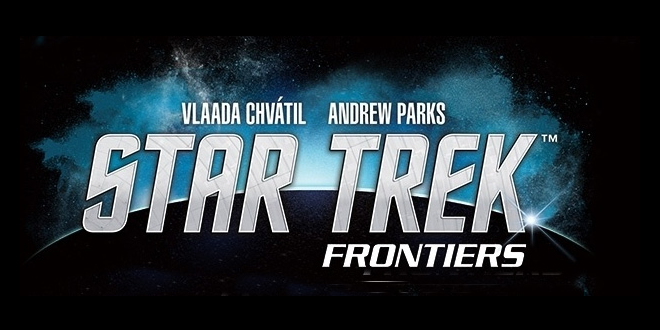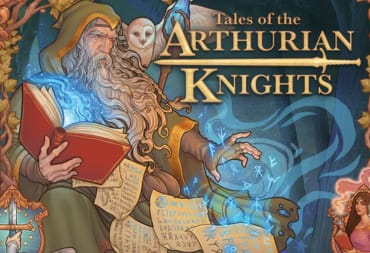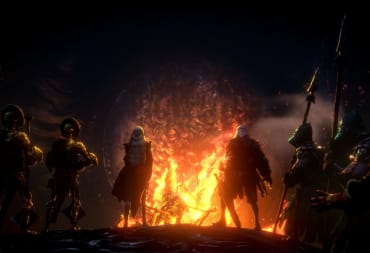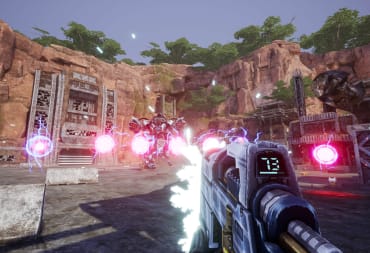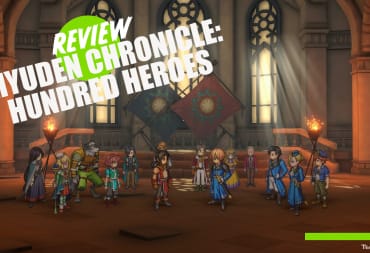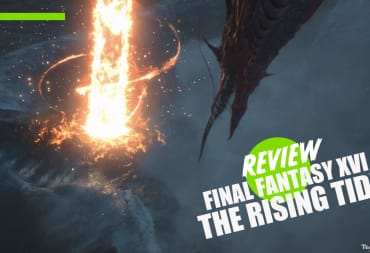Mage Knight is one of my favorite board games of all time and is widely regarded as one of the best board games ever. I tend to avoid directly comparing a game I'm reviewing to other games in the review, but in the case of Star Trek: Frontiers the comparisons are inevitable, and necessary. This is because Star Trek: Frontiers is, in the most basic terms, Mage Knight in space. It is more than a simple re-theme though and contains changes that streamline the game, make it more forgiving, and fit in very well with the Star Trek theme. If you played Mage Knight and hated the mechanics, you are probably not going to like Star Trek: Frontiers. If you like the mechanics of Mage Knight, but would prefer a different theme, you will almost certainly like Star Trek: Frontiers. Finally, if you haven't played Mage Knight before, or were intimidated by its complexity, you will find a tweaked, more forgiving ruleset in Star Trek: Frontiers, making it a great choice for getting in to this wonderful, complex, and rewarding game system.
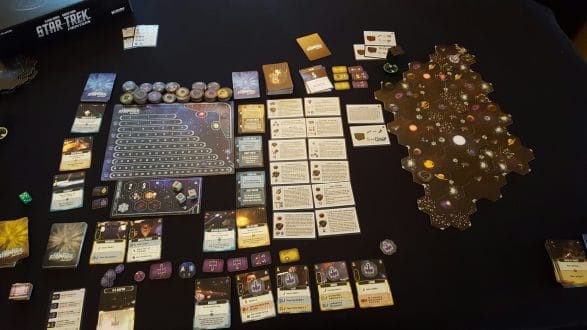
Star Trek: Frontiers is a game of adventure and exploration that, upon first blush, looks like a random Ameritrash-style romp through space, yet it is actually a very deep and deliberate strategy-puzzle game that places huge emphasis on player agency and skill. Each player leads a ship, either the Picard captained Enterprise D, the Sisko captained Defiant, the Martok captained Negh'Var, or the Duras Sisters captained D12 Kingon Bird of Prey, and tackles one of the 10 available scenarios in a race to gather the highest Reputation by game end. While there are numerous random elements to the game, the fate of each player's ship, Captain, and Crew is entirely dependent upon the choices that players make each turn, whether that be where to move, what to interact with, and, most importantly, how to play each card from your hand. Player success is entirely dependent upon their choices in this game, and it provides a wonderful sense of accomplishment when players succeed.
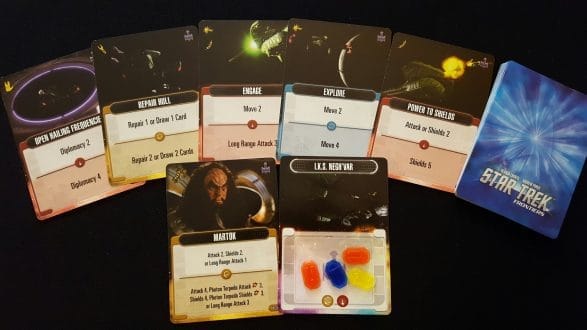
Players control their ships via decks of cards unique to each ship. Each card has two effects listed on it: one basic effect, such as granting 2 movement points, or 2 attack points, and a powered up effect that costs a Data Crystal or Data Token of the appropriate color to activate. To mitigate the luck of the draw, each card can also be played sideways for 1 point of Move, Attack, Shields or Diplomacy. Every turn, the player must determine their best course of action based on the cards that they have in their hand. Deciding how best to use the cards drawn each turn is key to success in Star Trek: Frontiers, and often, with careful consideration and smart card-play, players can find ways to overcome obstacles that appear daunting or impossible on first blush, especially after augmenting their deck of cards with some of the powerful Advanced Action and Unknown cards that players can acquire on their adventure. Players can tailor their deck to suit their playstyle and needs with careful Advanced Action and Unknown card selection during the game, and the added power really gives a satisfying sense of growth and gain as more and more cards are added to a player's deck.
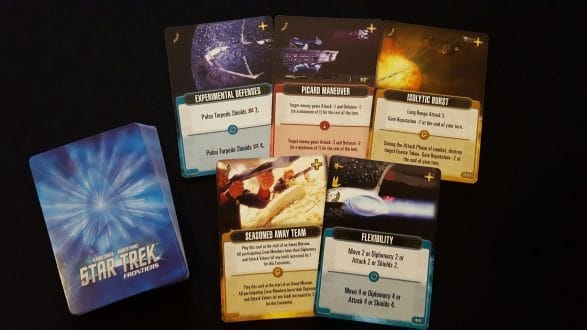
As players explore, discover, and overcome obstacles during play, whether it be via battle or via Diplomacy, they gain experience. As players go up in experience, they will gain levels, which either grant a new skill and an Advanced Action card—which are similar to the cards in each player's deck, but often are more powerful or versatile—or they gain the ability to recruit more Crew Members, as well as increasing their hand size and ship and Captain toughness. Players can also acquire Undiscovered cards to add to their decks, which are powerful cards (akin to Mage Knight's Spells) that require Data to use either of their effects. The Undiscovered cards aren't gained via level-up, but can be acquired as a reward for defeating certain encounters and purchased at certain locations. Saving an Undiscovered card in your hand only to unleash it for its full effect at just the right time is an awesome feeling and can single-handedly turn the tide of a difficult encounter.
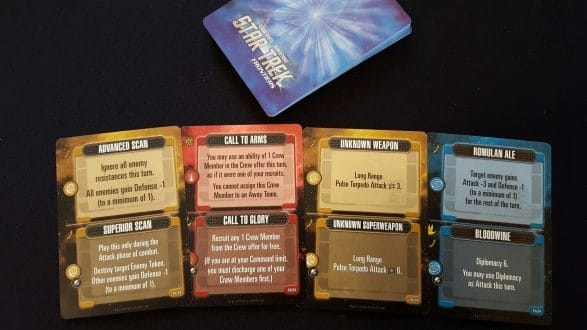
While recruiting Units in Mage Knight was helpful, but not vital, gaining new Crew Members in Star Trek: Frontiers can be key to success. Having a strong crew is often necessary to succeed at Star Trek: Frontiers' most interesting addition to the system: Away Missions. Players will encounter hostile planets during their exploration, which are interacted with and overcome by beaming an Away Team down to the planet in order to tackle the challenge presented by that planet. While the player can simply try to deal with the obstacle by sending only a Basic Security Team, and thus relying on the cards in their hand, it is much easier to beam multiple Crew Members down to assist in dealing with the situation. The best part about the Away Missions is that each of these encounters can be dealt with via combat or Diplomacy. If players, and their chosen Crew, are diplomatic enough, combat can be avoided entirely and the encounter can be overcome peacefully. If players wish to go in guns blazing, they can take that approach instead. The Away Missions are thematic, and the additional options for dealing with them are fun and interesting. Additionally, damage is now split into two categories. Ships take damage, while Crew and your Captain take wounds. Damage is repaired, and wounds are healed. It's a small distinction, but it's a thematic and fun one nonetheless, and having a wounded Captain can be a serious hindrance, as it limits the skills that can be used and the cards that can be played while the Captain remains wounded.
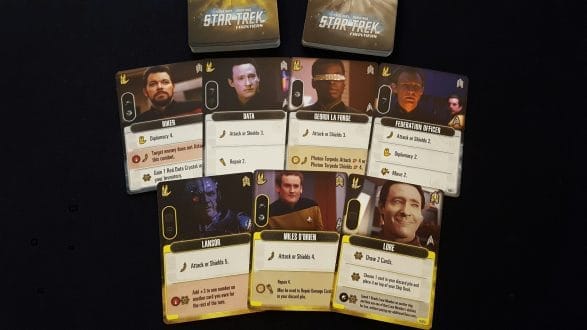
Combat itself has been changed from Mage Knight, especially when it comes to blocking damage. In Mage Knight, you either blocked an attack in its entirety, or the block didn't count at all. In Star Trek: Frontiers, you can partially block each attack, and so you are only forced to take any damage that is in excess of the Shields used to block. You can only block one enemy at a time though, so you can't carry over extra Shields from one enemy to the next. Gone too are Fortified enemies and Siege attacks. Star Trek: Frontiers has only Long Ranged attacks and normal attacks. These changes make combat slightly less risky and therefore a bit less tense and exciting, although it also makes combat much easier to comprehend, especially for newer players. Personally, I prefer the more difficult combat in Mage Knight, although combat is still really fun, and more intuitive in Star Trek: Frontiers.
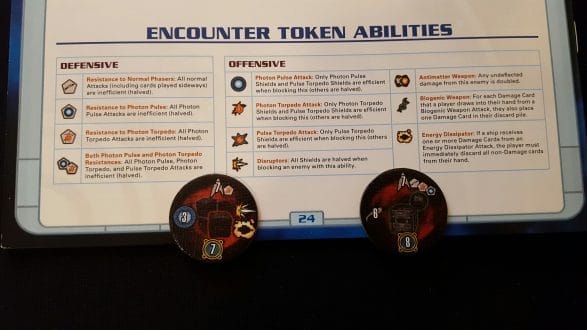
Another new twist on combat and interactions comes when encountering both space and terrestrial enemies together, most often when assaulting a Borg Cube (Star Trek: Frontiers version of Mage Knight's Cities). In these situations, players have to resolve the space combat first, and then beam an Away Team down to deal with the planet encounters immediately afterwards. This deliberate order of interactions means that players can't just go all in on one big combat and have to be more careful about allocating resources to each threat.
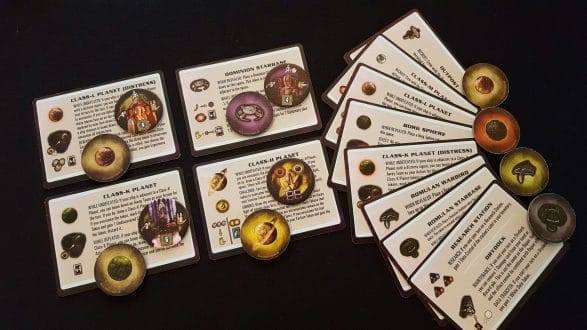
There are a few things in Frontiers that clash with the Star Trek theme. In Mage Knight, the theme is generic fantasy. You create your own story and your motivation is to be as selfish as possible, as you are competing for personal gain and glory. You gain and tally points in almost exactly the same way in Star Trek: Frontiers, and have the option to do many of the same dastardly, selfish things, but the motivation for some of the already known characters from the Star Trek lore feels a bit off. Both games track your reputation as you play, and if you are too much of a bastard you will have increased Diplomacy costs, but that is the only downside. There are no real ramifications to being an absolute jerk, as negative reputation doesn't affect your score at the end of the game. It doesn't feel odd to be a space-bastard when playing as The Sisters, who are out for their own personal honor and glory, but it feels really off, to me at least, to play as Picard and do things that are morally grey-to-black. I know that there are people out there who will enjoy playing the Enterprise D and Picard that way, but it takes me out of the game a bit to do so. Also, some iconic Star Trek personages are available as recruitable Crew. It feels really odd to recruit William Riker as anyone other than Picard, especially when someone else is playing Picard in the same game. These things don't detract from the gameplay per se, but they feel a bit off thematically.
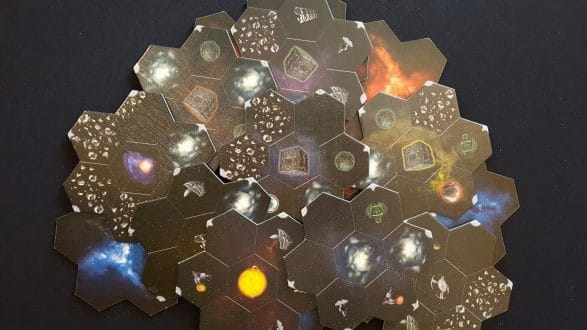
There are a few more changes that Star Trek: Frontiers makes that streamline things a bit further. Gone are the day and night cycle, so movement around the various tiles is easier to plan. Gone too are Mage Knight's super powerful Artifact cards, but this loss isn't felt as much as I was expecting it to be, especially considering the split interactions when encountering a mix of space and terrestrial encounters.
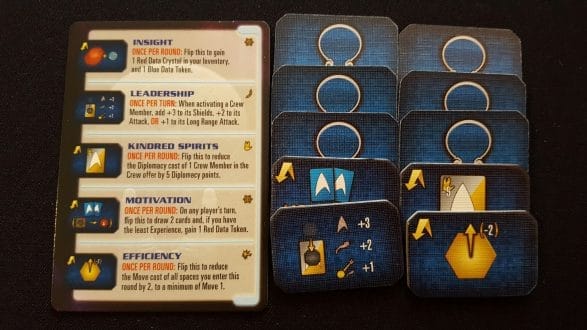
A note on complexity: Being built upon Mage Knight's framework, Star Trek: Frontiers is a complex game, with a plethora of options, rules, and interactions to learn and consider while playing. Quite a few things have been streamlined in Star Trek: Frontiers though, making it a more forgiving game overall and slightly easier to learn than Mage Knight. This is still a deep strategic game of puzzle solving and action economy though, so, even though it is "easier" than Mage Knight, if you are new to this game system, expect to put in three or four games to get a grasp on the system before you can begin to succeed on a regular basis.
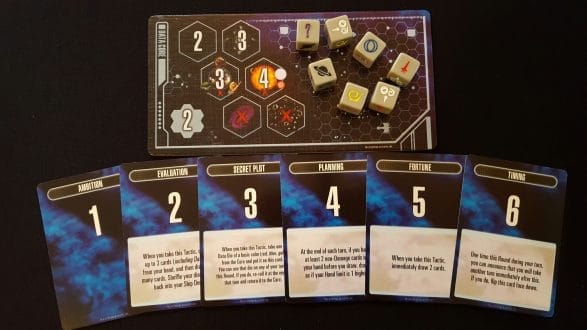
A note on solitaire play and game time: Star Trek: Frontiers is an amazing solitaire experience, with each Solo Conquest played clocking in at about the 90 minute mark. Expect each additional player to add at least 90 more minutes of play time, with new players adding even more. Because of the deliberate puzzle solving nature of play, expect a four player game to last 4+ hours. Keep in mind that downtime between player turns can be very long. A player turn can easily last 5+ minutes, so expect a long downtime between each player turn if playing with 4 players.
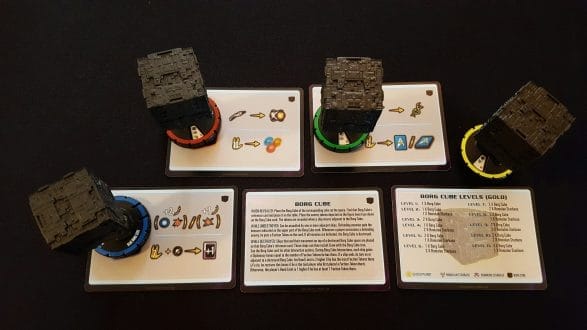
A note on “chrome”: The miniatures and components in Star Trek: Frontiers are decent, with a few notable exceptions. A few of the tokens and one of the map tiles look as though the art was either partially rubbed off or scuffed badly, and the back of one of the cards from Sisko's deck has a noticeable pink spot on an otherwise completely blue and white card back. The symbols showing which enemies you will face on the clix base when you assault a Borg Cube are extremely difficult to read, although they are listed on the back of the Borg Cube card so that is close to a non-issue.
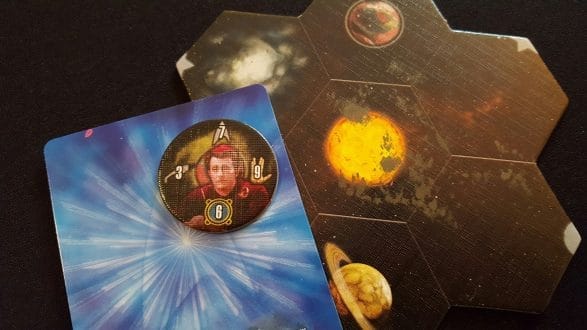
The rulebooks, on the other hand, especially the walkthrough, are very well-done. The walkthrough does a wonderful job of teaching in a learn-by-doing manner and neatly lays out the various game mechanics and ideas in an easy to follow, simple to digest manner. Even if you haven't played Mage Knight, you should be able to jump right in to the basics using the walkthrough, and if you have played Mage Knight, the walkthrough does a great job of outlining the differences between the games without having to dig through the rules to find them. Also like Mage Knight, rules reference cards are included for just about everything that players will interact with while playing the game, and they serve as great reminders of how each bit works, which saves a ton of time over having to flip through the rulebook if you have a question.
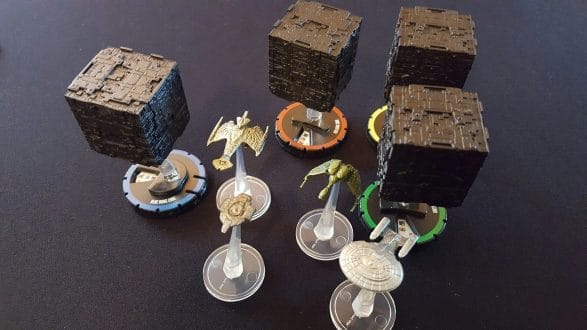
The bottom line:
Star Trek: Frontiers takes the awesome foundation from Mage Knight, replaces the fantasy theme with Star Trek, and changes things just enough to make the game feel both familiar and fresh. Theme is still secondary to the tight, strategically deep mechanics, yet most of the additions and changes fit in very well with the Star Trek veneer. Away Missions are a great new addition to the system and provide a very interesting challenge, especially when assaulting a Borg Cube that presents both space and terrestrial encounters. The game is a bit more forgiving than Mage Knight, especially in combat, which means that Star Trek: Frontiers should appeal to a wider audience, although it does lose a bit of tension in the process. While there are a few small hiccups in the art department, Star Trek: Frontiers really only loses a bit of luster when compared (inevitably) to its now Classic older sibling. This is a game built upon an outstanding system, with a fun theme that works well with those mechanics to provide an amazing end result. Like Mage Knight before it, Star Trek: Frontiers is best as a solitaire or 2 player game due to length of the game and the large downtime between turns when played with a full compliment of players. Star Trek: Frontiers gives a fun, satisfying sense of progression and exploration. It lays a wonderful, evolving puzzle out in front of you, gives you to tools to solve it, and then lets to tackle it as you see fit.
Get this game if:
You like big, complex games with a huge emphasis on player agency over luck of the draw.
You enjoy playing solitaire board games.
You are interested in Mage Knight but were turned off by the fantasy theme.
You already enjoy Mage Knight and want a more forgiving experience, with a neat Star Trek coat of paint.
Avoid this game if:
You prefer games with a shorter (< 90 -120 minute) play time.
You dislike games with a steep learning curve.
You have played Mage Knight and dislike its mechanics.
The copy of Star Trek: Frontiers used for this review was provided by Wizkids.
Review Summary
Star Trek: Frontiers is an amazing game. Built upon the rock solid mechanics of Mage Knight, it streamlines, simplifies and changes just enough to feel like its own game. Even with those changes, this is still a deep, thoughtful and strategic experience, and it works especially well as a solitaire game.
(Review Policy)Have a tip, or want to point out something we missed? Leave a Comment or e-mail us at tips@techraptor.net
